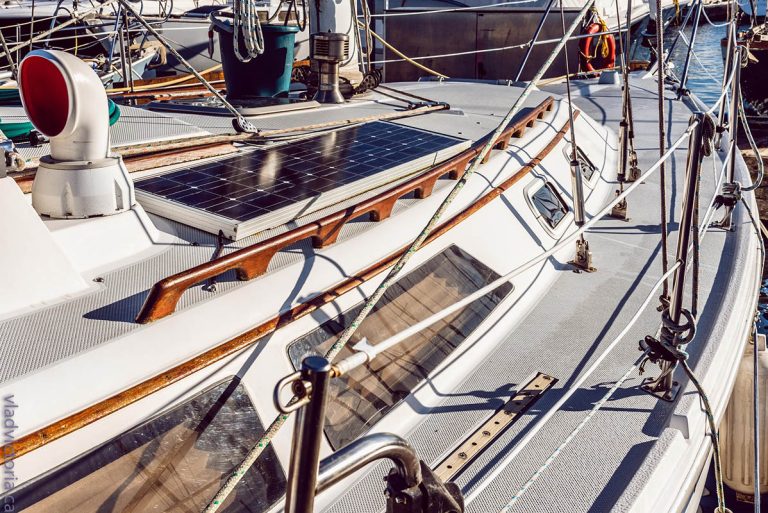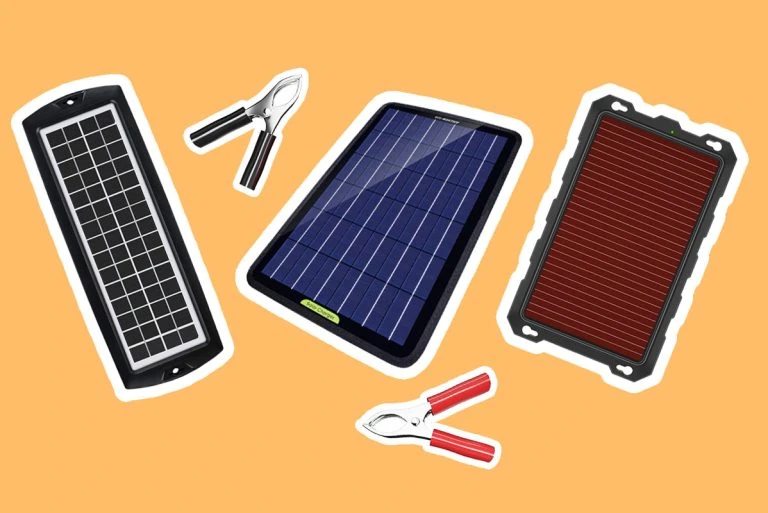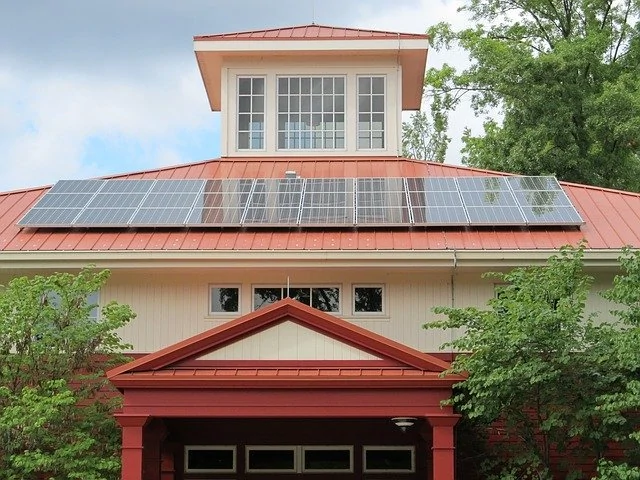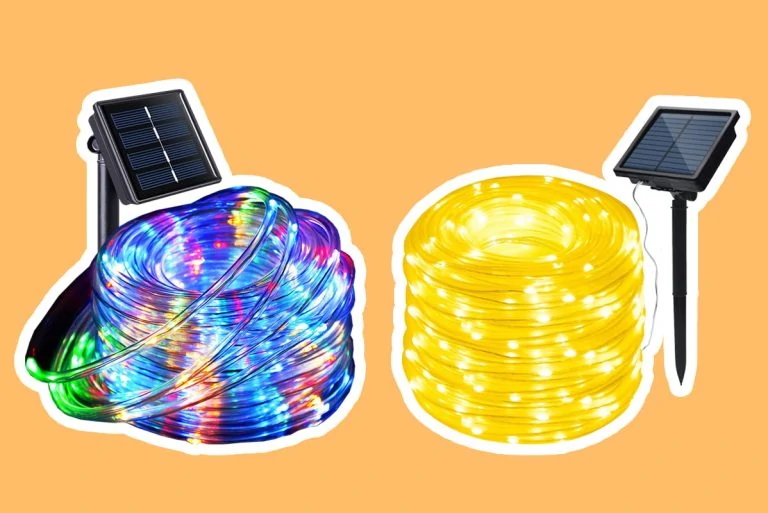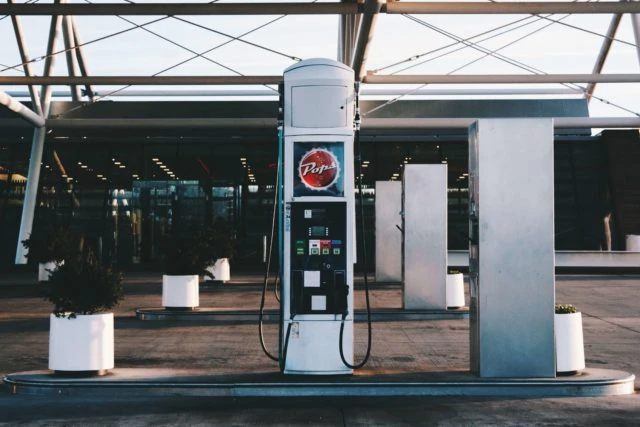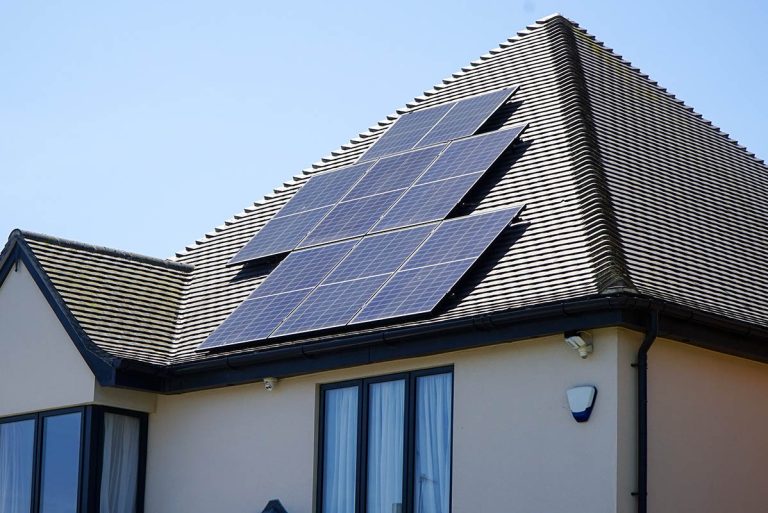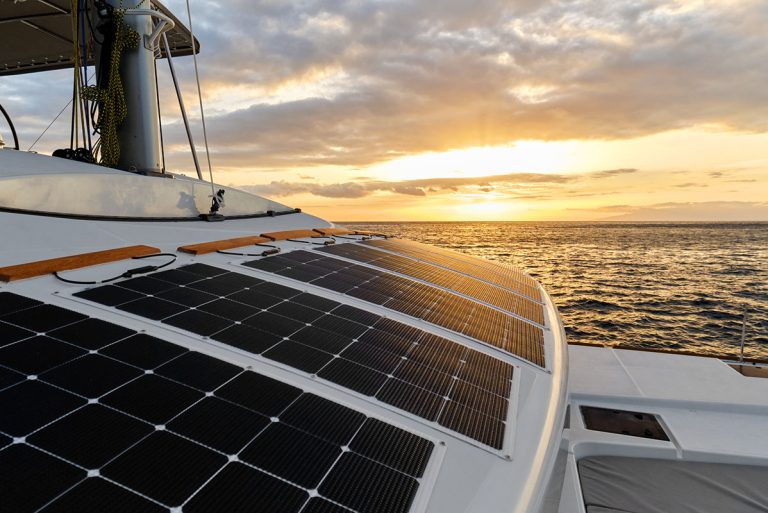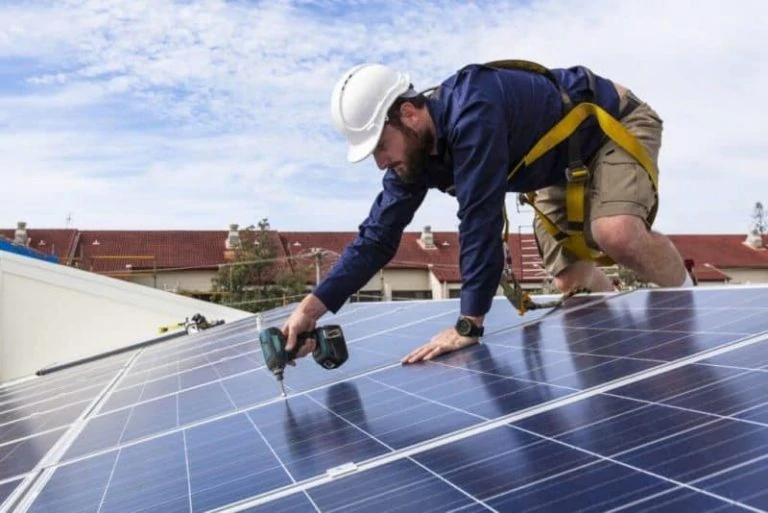Solar power is the perfect solution for meeting your energy needs when you’re out on the water, but you can’t necessarily use the same solar panel you would on your home. Here are our top picks for the best boat solar panels, as well as some info you should know when buying a marine solar panel.
The best marine solar panels for your boat
Thanks to advances in solar technology, there’s now a dizzying array of solar panels available on the market in various forms. However, some are better suited to marine conditions than others: the following products are your best bet to install on your boat.
1. Renogy 400 Watt 12 Volt Solar Premium Kit
For a truly powerful solar system, look to this 400-watt solution from Renogy. This comprehensive kit includes four 100-watt solar panels, a 40-amp MPPT charge controller, module fuse, mounting brackets and an adapter kit.
Combined, the panels output up to a total of 2.5kWh of electricity per day (provided there’s enough sun), to power most boat engines with power to spare for appliances.
The high-quality panels have a bypass diode that bypasses cells that are performing poorly because they’re in the shade, to minimize power drops when the solar panel is in partial shade, and therefore delivering strong performance in a low-light environment.
However, you will need enough space on your boat to accommodate four 40 x 21 inch panels, which will probably only fit on a larger vessel. Online reviewers also complain that the kit doesn’t come with detailed assembly instructions, so you may struggle to put everything together, especially if you’re a beginner.
What we like:
- Powerful: The total system delivers 400 watts of power output, or 2.5kWh of electricity, in optimum conditions.
- Bypass diode: Which maximizes the solar panel’s performance by bypassing cells that are in the shade, allowing the panel to perform well in low light.
- Powerful: This kit will produce a total of 400 watts, so is great for charging larger boat batteries or running a number of appliances onboard.
- Solid and durable: The panels have multi-layered sheet laminations and come in a corrosion-resistant aluminum frame, so will stand up to different conditions without damage, so you can be confident they’ll stay in good condition wherever you take your boat.
What we don’t like:
- Instructions not very extensive: The kit doesn’t come with an extensive manual to help you put everything together, so you might struggle if you’re not particularly handy.
Despite the lack of clear instructions, overall this is a well-made, powerful solar kit. If you need lots of power and have the space for four solar panels, this could be the best choice for you.
2. Newpowa 20W Monocrystalline Sailboat Solar Panel
This panel is a good choice if you have limited space and don’t need too much power for your boat. Each panel has only 20 watts of output, but is very compact: in fact, the new design is highly-efficient, allowing it to be even smaller than previous models, at just 13.6 x 14.2 inches.
With such small dimensions, you may be able to install several panels on an irregular boat roof or in other tricky spots. However, keep in mind that even with a few of these panels, you probably won’t have enough power to run your boat battery.
Newpowa’s 20-watt solar panel is built to last. It comes with a two-year workmanship warranty, and an output warranty that guarantees 90% power for 10 years, and 80% for 25 years.
The panel is slim, but with sturdy aluminum frames around the panel and between each cell, so it’s designed to stand up to harsh conditions, including winds up to 2400Pa and hail and snow loads of 5400Pa. Therefore, you’ll be able to take this panel on your boat through all kinds of weathers without it being damaged.
What we like:
- Compact: At just 13.6 x 14.2 inches, this small panel will fit in all kinds of tight spots, making it easier to find a mounting location on your boat.
- Good workmanship: The panel is well-made, backed up with a generous warranty, meaning you can feel confident that on the slight chance of any faults or issues, they’ll be resolved by the manufacturer.
- Durable: The Newpowa panel has a sturdy aluminum frames between each cell, and can stand up to high winds, hail, and snow, which is obviously very important for solar panels for boats
What we don’t like:
- Low power output: This panel has a relatively-low 20-watt power output, which isn’t great because it will only supply enough energy to run one or two appliances part time.
Small, slim and durable, this high-quality solar panel is perfect if you have low power needs on your boat, or as part of a larger solar system.
3. ACOPOWER 35W Polycrystalline Sailboat Solar Panel
Specifically designed for boats, this small polycrystalline solar panel provides 35 watts of power. It’s highly efficient with a conversion rate up to 19.1%, so you’ll get the maximum amount of power output in return for the precious space on your boat.
Suitable for all climates and conditions, the silicon cells have a protective coating and come in a corrosion-resistant aluminum frame. It’s rated for high winds to 2400Pa, snow loads to 5400Pa, temperatures between -40 and 176 degrees F, and up to 100% humidity.
We also love that this panel is easy to install, coming with four pre-drilled holes, junction box and a three-foot solar cable. It’s compatible with a range of mounting systems, including Z-brackets, pole mounts, and tilt mounts, making it easy to place virtually anywhere on your boat, from the roof to the stern.
What we like:
- Suitable for all weathers: The panel is rated for extreme cold and hot temperatures, as well as high humidity, winds, and snow loads, which is good because boat solar panels may be exposed to all of these conditions.
- Easy to install: It comes with pre-drilled holes for easy installation, as well as being suitable for various mounting systems, so can be mounted in varying locations on your boat’s roof.
- Highly-efficient: This panel has an impressive maximum conversion rate of 19.1% so will perform well in low-light environments, meaning you’ll still have power on overcast days.
What we don’t like:
- Inconsistent quality control: Some reviewers mention issues with parts and accessories failing or breaking, though many also mention the manufacturer quickly resolved the problem. However, it’s worth remembering the affordable price of this panel – so if the quality issue is a big concern, better to opt for something more premium.
Some online reviews mention issues with some parts breaking during install. However, with a five-year workshop warranty, a 20-year power output warranty, and lifetime technical support, you can feel confident that, on the slight chance that you do experience any issues, they’ll be resolved easily.
Despite even this, the Acopower is worth your attention because of its affordable price and easy, out-of-the-box design that’s easy to install right out of the box.
4. Newpowa 160W Monocrystalline Sailboat Solar Panel
For significantly more power, consider this 160-watt panel from Newpowa. The panel does involve a higher investment than small panels, but you’ll be able to charge your boat battery and perhaps even run some appliances with the power this product delivers.
The panel is made of top quality, high-performance polycrystalline cells fitted with an aluminum frame, making it efficient but durable. It uses 9 busbars (9BB) technology which converts light more efficiently while lasting longer.
It’s also easy to install, coming with diodes pre-installed in the junction box, as well as two pre-attached 3-foot MC4 cables, so all you need to do is mount the panel and you’re good to go! The well-made panel comes with a 10-year 90% power output warranty, 25-year 80% output warranty, and two-year limited material and workmanship warranty.
What we like:
- Highly efficient: This panel’s use of 9BB technology makes it more efficient and longer lasting than many other panels.
- Easy installation: With pre-installed diodes and pre-attached cables, this panel is a piece of cake to install, so it’s a great option for those who aren’t experienced with this type of thing.
- Long life: The panel is made with advanced 9BB technology that is efficient and long-lasting, so you won’t need to replace your panel for years to come.
What we don’t like:
- Expensive: You’ll pay more for the extra power, so it’s important to be sure that a smaller panel won’t suffice.
This powerful and efficient Newpowa panel is built to last, evidenced by the generous manufacturer’s warranty, making it an excellent boat solar panel.
5. Nature Power 120W Portable Sailboat Solar Panel
This portable solar panel from Nature Power can be set up and used anywhere, so is a great solution if you don’t have space on your boat to install a permanent panel. Equally, this can be a good option if you only want to use it on a boat occasionally, and also use it when camping, trekking, or at home during emergencies.
The compact, foldable panel can be set up anywhere there’s sun, and then easily stored or transported after use. The panel folds out to 67.2 x 24.8 x 3 inches, and then can fold up into the size of a slim suitcase with an easy-carry handle.
Thanks to its high-efficiency, monocrystalline cells, this small panel can produce up to 120 watts and 6.67 amps of output. It also comes with a charge controller to help you efficiently charge your battery, and a built-in diode to avoid discharging.
Although the panel itself is well-made and robust, some online users complain that the clips and stand are less durable, with some reporting breakages.
What we like:
- Portable: The panel can be folded up and easily transported, thanks to its easy-carry handle. This is great because you can use it on your boat when needed, then for other uses, such as for camping or emergencies.
- Highly efficient: Thanks to its advanced monocrystalline cells, this panel delivers 120 watts despite its small size and slim design.
- No need to install: Simply set up the panel on your deck when you need some power, and then fold it away, so a great option if you don’t want to fuss with installation or don’t have space on your boat to put it up permanently.
What we don’t like:
- Low-quality accessories: Some online reviews mention the poor quality of the panel’s accessories such as the clips and stand.
Overall, this portable solar panel is a great choice if you’re unable to mount a panel on your boat, or want the freedom to use it in different locations.
6. Nature Power 165W Sailboat Solar Panel
This monocrystalline solar panel is powerful, durable, and efficient. The modular design, robust aluminum frames, and scratch-resistant, anti-reflective coating means the panel will stand up to all weather conditions, making it perfect for your boat.
This panel is sold on its own, but the brand also offers an 8-amp solar charge controller that you can use with any 12-volt battery to build your own boat solar kit. The panel itself comes with a built-in diode, as well as “plug and play” connections that are easy to install.
What we like:
- Monocrystalline: The monocrystalline cells make this solar panel very efficient, giving you a powerful output of 165 watts with just one panel.
- Robust: The panel is built to withstand all conditions, with a strong aluminum frame and scratch-resistant coating.
- Easy to install: The panel comes with simple, “plug and play” connections, making it a breeze to install, so is perfect for beginners.
What we don’t like:
- High cost: Because of its premium construction and features, this is not the most affordable solar panel on the market.
This panel is relatively expensive, and there are more affordable options available, but you get a high-quality, well-made panel in return for your investment. Furthermore, it comes with a 25-year power generation warranty, so you can be confident that you’re unlikely to encounter any major issues for years, and if you do, they’ll be resolved.
7. Topsolar 100W 12V Solar Panel Kit
This complete solar kit contains one 100-watt solar panel, intelligent charge controller, v-shaped tilt bracket, as well as two 16-foot and two five-foot cables with MC4 and O-ring terminals, making it easy to install and connect.
This set is designed for off-grid, outdoor use such as on boats, RVs, cabins, and yards, and suitable for charging car and boat batteries. The panel is highly durable, thanks to its corrosion-proof aluminum frame and tempered glass coating, so will cope with whatever conditions you throw at it.
The high-efficiency monocrystalline PV cells deliver 100 watts of power in a relatively compact 46.5 x 21.8 inch panel that’s just 1.37-inch thick. The adjustable mounting bracket can tilt to capture the maximum amount of direct sunlight, helping you get the maximum amount of power for your boat.
What we like:
- Complete kit: With a 100-watt panel, charge controller, bracket, and cables, you have everything you need to set up and install your marine solar system.
- Tilted mounting bracket: Meaning you can tilt the panel to capture the maximum amount of sunlight.
- Versatile: The kit comes with two 16-foot and an additional two five-foot cables featuring both O-ring and MC4 terminals, meaning you can connect it to different types of equipment and in various locations.
What we don’t like:
- Problematic controller: Online reviewers complain about performance issues with the charge controller.
The most common complaint about this set is that the controller is low-quality, though the panel itself works very well. However, overall this is a good set for any boat with medium power needs.
8. 200 Watt 12 Volt Monocrystalline Solar Starter Kit w/ MPPT Charge Controller
This kit comes with two 100-watt poly/mono-crystalline solar panels, a 40-amp MPPT charge controller, Z-brackets for mounting the solar panel, an adapter kit, and connector cables. However, it should be noted that the kit lacks a few important accessories, such as fuses, so you’ll need to buy these separately.
Although these two 100-watt solar panel can supply up to 800Wh power output a day if there’s enough sun, they have a small footprint. This makes the kit ideal for boats, as you can install them in small and compact spaces, like the roof of your sailboat.
The solar panels are also highly-efficient, with 22% solar cell efficiency, significantly higher than many comparable products. With a corrosion-resistant aluminum frame, the panels will also stand up to all weathers, including winds of up to 2400Pa and snow loads of 5400Pa.
This means you can be confident they’ll last for decades no matter what kind of conditions your boat faces over the years!
What we like:
- Maximum power for the footprint: The solar panels are highly-efficient, giving you the maximum amount of energy without taking up too much space.
- Corrosion-resistant frame: The aluminum frame is resistant to corrosion, so will keep its form in salt water and harsh weather.
- Charge controller included: The kit comes with an MPPT charge controller, adaptor, cables, and mounting brackets, so you won’t need to invest in extra equipment and can get started straight away!
What we don’t like:
- Some accessories not included: Although this is sold as a complete kit, it lacks a few important bits and pieces, so you’ll need to be prepared to avoid disappointment when trying to install your panels.
Overall, this is a good medium-sized kit that delivers a reasonable amount of power with the minimum footprint.
Why buy a boat solar panel?
Most boats require a lot of electricity, from powering navigation lights and radio systems to maintaining autopilot and, most of all, the boat battery. If you use your boat for longer trips, you’ll probably also need electricity for appliances like fridges, heaters, and even a TV.
Traditionally, many boats used gasoline or diesel generators to supply this power, but relying on solar energy instead has a number of advantages. Not only is it more environmentally friendly, but the sun will always shine (even if it’s not full sun), so you’ll have a continuous supply of energy and won’t need to worry about running out of fuel.

Source: Wikimedia / Jean-Pierre Bazard
Furthermore, unlike noisy, smelly generators, solar systems are quiet, odorless, and don’t create excess heat, so won’t make your boat unpleasantly warm in summer. Once you’ve made the initial investment, solar panels are cheap to run, as you don’t need to pay for fuel – after all, sunshine is free!
What to consider when buying boat solar panels
There are many different types of solar panels, just as boats can come in all shapes and sizes. Therefore, it’s important to consider the various features offered by different panels in order to choose the right model for your boat.
Here are the key things to keep in mind when shopping for boat solar panels.
Panel output and efficiency
The first thing to consider when buying a solar panel for your boat is how much power it will produce, and whether this will be sufficient to meet your needs. You need to consider what you want to use the panel for: for example, do you just want to run a couple of onboard appliances, or are you looking to power your boat’s battery as well?
Once you’ve determined this, calculate how much power you’ll need (more on how to do that below), and this will give you an indication of the power output you should look for when buying your panel.

Source: Flickr / Timo Newton-Syms
Durability
It’s important to get a robust panel that will stand up to all kinds of weathers and conditions without getting damaged.
The most durable panels come with a sturdy metal frame, often made of aluminum to keep weight to a minimum.
Waterproofing
Obviously, the ability to stand up to water is essential for any marine solar panel. Most good-quality solar panels for any purpose are highly resistant to water, as they’re designed to be placed outdoors in the rain.
Even still, it’s important to check that waterproof level of any solar panel before buying it for your boat. Specifically, look for a panel with a IP67 rating, as this indicates that the panel is highly resistant to water damage.
Weight and flexibility
Another important factor to consider is weight. You usually have two options when installing a solar panel on a boat: on the roof or on the stern, usually supported with some kind of bracket or scaffolding.
As neither boat roofs nor brackets are typically designed to support a lot of weight, it’s important to buy panels that are light. With limited space and low clearance, it can also be a good idea to look for thin panels that are not much more than an inch thick.
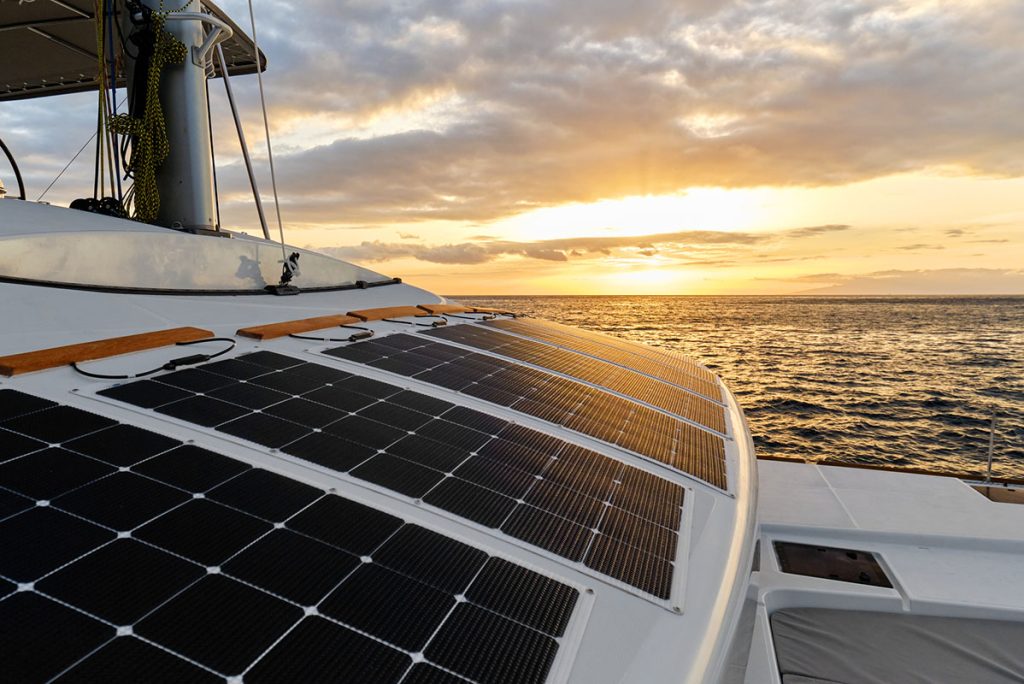
As most boats have curved roofs, a flexible solar panel can often be the way to go. These kinds of panels are not rigid, but can bend to fit irregular surfaces.
However, flexible solar panels tend to be less efficient and generally don’t last as long as rigid ones, so you’ll need to weigh up these factors to make the right choice for you.
Ease of installation
When buying a solar panel for any purpose, how easy it is to install is a key consideration, unless you’re planning to hire an expert to handle this for you. This is even more critical when buying a marine solar panel, as installing the equipment is more difficult than ever on a boat that may be moving and swaying with the waves.
Pay attention to how the panel is installed: flexible solar panels can often be simply attached with an adhesive, though you’ll need to make sure the glue is suitable for marine applications. Rigid solar panels can be more difficult to put up, though some come with grommets and pre-drilled holes that make things easier.
Reading user reviews on sites like Amazon will usually give you a pretty good idea of whether the panel is tricky or pretty straightforward to install.
Questions to ask yourself before buying t solar panel for your boat
The right solar panel for you will depend on a range of factors, from the size of your boat to your power needs. Understanding these key factors will help you to make the right decision and buy the perfect marine solar panel for you.
What size solar panel do you need?
You’ll need to work out how much energy you need to determine the right size solar panel to buy. You can calculate this by adding up the typical amp hours and volts used by all of the appliances on your boat – the average amp hours are usually printed on the label or elsewhere on the appliance.

Source: Wikimedia / Liese Coulter, CSIRO
For a more accurate measurement, use a battery monitor to get a reading of the amp hours your boat uses. Monitor your usage over several days while you’re on the boat (the more the better) and divide the total figure by the number of days to get your average amp hour usage per day.
How big is your boat’s battery?
You’ll also have to consider the size of your boat’s battery. Other than the power you use in the hours of peak sunlight in the middle of the day, you’ll only be able use as much energy as you can store.
Also keep in mind whether you want to be able to charge your boat’s battery with solar or run your boat on gas and use the solar panel for appliances only.
Most boats have a 12-volt battery, which needs around 350 watts of power to charge. However, larger vessels can have a larger battery, which means you’ll need more panels.
Do you have enough space for a solar panel?
Once you’ve determined the ideal solar panel size for your boat and your needs, you also need to work out how much space you have to accommodate the panel. Assess your boat for suitable locations, keeping in mind that you need to install your panels somewhere that gets plenty of sun.
You can either mount your boat solar panel on the roof or on the stern, using a bracket or similar.

Source: Wikimedia / Ddgfoto
If you want to mount the panel on the roof, you don’t necessarily need a completely flat spot: flexible solar panels can be installed on curved surfaces, with the added bonus that they’re lightweight so can be put on boat roofs that can support too much weight. Likewise, high-efficiency panels that offer the same amount of energy with a smaller footprint, like the ACOPOWER 35W Polycrystalline Sailboat Solar Panel can be a good solution for smaller boat roofs.
If your boat really doesn’t have any suitable spots to mount a solar panel, a backup solution would be to use portable solar panels that you could set up on your deck or a similar space.
Do you need a charge controller?
When setting up a solar system for your boat, you also need to decide whether you want to include a charge controller. Some of the kits above come with a solar charge controller included, like the Topsolar 100W 12V Solar Panel Kit, but you can also buy solar panels on their own.
Charge controllers regulate the amount of energy that flows from the solar panel to the battery, helping to ensure that it doesn’t get overcharged or overloaded. This is important, because either of these things can damage the battery and shorten its life.
For this reason, although a solar charge controller is not strictly necessary when installing solar panels on your boat, it can be a very good idea in order to protect your battery and make sure your boat uses the right amount of energy for its needs.
Wrapping up
A boat solar panel is the ultimate solution for self-sufficiency, allowing you to run your boat on the energy of the sun. You won’t need to worry about running out of fuel, and having to go back to shore.
Not to mention that by using this clean, renewable energy will help you to reduce your carbon footprint and be kinder to the environment.
If you’ve found this guide to the best solar panels helpful, you’re sure to enjoy our posts on the best portable solar panels for camping, flexible solar panels and solar power output.
